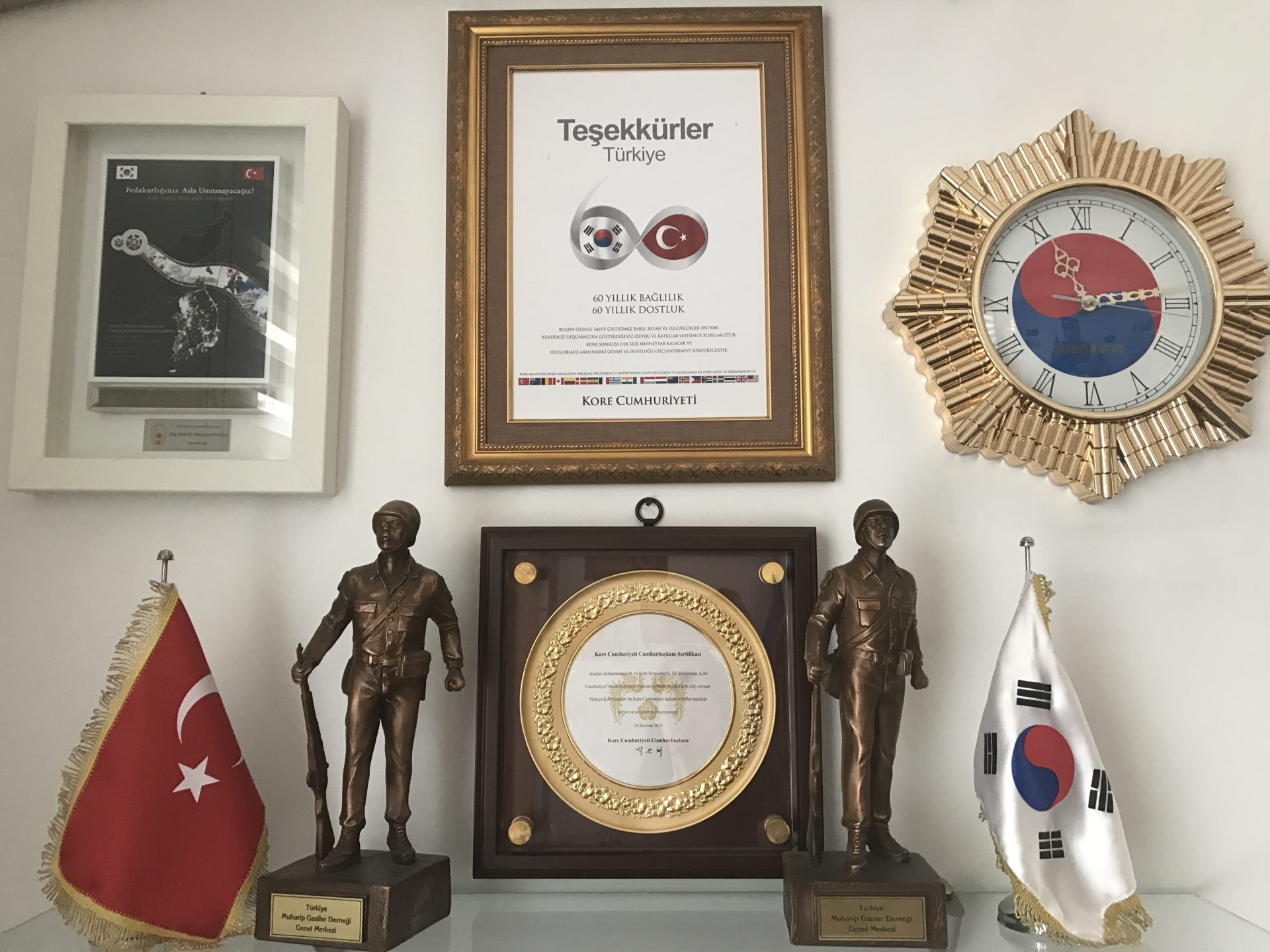Turkey Ankara (3)
>> [FOREIGN LANGUAGE]
>> My name is Usman Yashan Akem. I am a retired Sergeant Major. I was born in 1930.
>> [FOREIGN LANGUAGE]
>> I was graduated from my school in 1951. One year later in June 1952, I went to Korea. I participated in the Korean War.
>> [FOREIGN LANGUAGE]
>> My brigade was the Turk Brigade going to Korean War. I participated in the real conflicts, or conflict, I would say, conflicts.
>> [FOREIGN LANGUAGE]
>> I participated in the conflicts called Nevada Complex. It was really, really hard conflicts. It was the front lines of the Turkish Brigade.
>> [FOREIGN LANGUAGE]
>> During these conflicts, that night, we lost 140 ...
>> Seven.
>> ... 147, [FOREIGN LANGUAGE], Turkish soldiers lost their lives.
>> [FOREIGN LANGUAGE]
>> That was the truce from Communist Chinese troops fighting with us.
>> [FOREIGN LANGUAGE]
>> During those conflicts, almost 3,500 Chinese soldiers lost their lives between 24 to 26 hours.
>> [FOREIGN LANGUAGE]
>> This battle is called one of the biggest battles.
>> [FOREIGN LANGUAGE]
>> If we fought this area for 26 hours, maybe Chinese forces become the [FOREIGN LANGUAGE] and maybe it will make enough yield, loss of the war.
>> [FOREIGN LANGUAGE]
>> Chinese forces wanted to occupy most of the Korean territory and wanted to sit at the peace table, the powerful.
>> [FOREIGN LANGUAGE]
>> After this war, after this battle, the first version of the UN forces push the Chinese forces to sit at the peace table. Others, I think they wouldn't sit at the peace table.
>> [FOREIGN LANGUAGE]
>> After the Korean War, I continued my job in the Turkish army, and 8 years ago, I retired from the Turkish army. It was 8 years ago.
>> [FOREIGN LANGUAGE]
>> I have been serving ...
>> [FOREIGN LANGUAGE]
>> I have been serving at the Turkish War Veteran's Association here as the Chief of Social Affairs with my president together.
>> [FOREIGN LANGUAGE]
>> During the Korean War, I observed. I saw the situation of Korea. It was really brilliant.
>> [FOREIGN LANGUAGE]
>> When I visited Korea later, I saw they have evolved. During the Korean War, there was another job we have to do to protect the children.
>> [FOREIGN LANGUAGE]
>> I visited Korea after the war a few times.
>> [FOREIGN LANGUAGE]
>> I attended some activities over there.
>> [FOREIGN LANGUAGE]
>> After a visit, I saw that Korea do a lot and every other year.
>> [FOREIGN LANGUAGE]
>> We have peace at the 741 Turkish soldiers lost their lives. After we saw that, observed that Korea do a lot, so we didn't fought for nothing. We have to deal with North Korea now.
>> [FOREIGN LANGUAGE]
>> Our main wish and hope to Korea be united and will be one country.
>> [FOREIGN LANGUAGE]
>> I wish happiness for the Korean people. Thank you.
>> Thank you. I have one question.
>> [FOREIGN LANGUAGE]
>> Everyone says he's a hero, right? So maybe he cannot say, but I want to know about his heroism.
>> [FOREIGN LANGUAGE]
>> [FOREIGN LANGUAGE]
>> He says army soldiers, that's his job. He did his job and served during the Korean War, so maybe other people will consider his service as heroism, but he says he cannot say.
>> [FOREIGN LANGUAGE]
>> There are those who died but never forgotten.
>> [FOREIGN LANGUAGE]
>> They're real in his memories.
>> [FOREIGN LANGUAGE]
>> I will show you my pictures and what I did. I will show my pictures, so it would be better if you side my service, my heroism.
>> [FOREIGN LANGUAGE]
>> When I went to Korea, my picture ...
[ Chatter ]
>> [FOREIGN LANGUAGE]
>> My picture ...
>> [FOREIGN LANGUAGE]
[ Chatter ]
>> [FOREIGN LANGUAGE]
>> I was 22 years old when I ...
>> Handsome!
>> [FOREIGN LANGUAGE]
>> [FOREIGN LANGUAGE]
[ Chatter ]
>> [FOREIGN LANGUAGE]
>> Maybe you can tell me in English about his heroism.
>> He prefer to show his pictures.
>> Oh, that wasn't the picture?
>> Oh, no. Oh, no.
>> Oh, got it. Okay. We'll do it after. Okay.
>> So after you you see his pictures ...
>> Yes.
>> ... he wants you to decide about his heroism.
>> Okay, okay.
>> [FOREIGN LANGUAGE]
